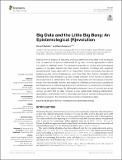Big Data and the Little Big Bang: An Epistemological (R)evolution
Author(s)
Balazka, Dominik; Rodighiero, Dario
Downloadfdata-03-00031.pdf (850.5Kb)
Publisher with Creative Commons License
Publisher with Creative Commons License
Creative Commons Attribution
Terms of use
Metadata
Show full item recordAbstract
Starting from an analysis of frequently employed definitions of big data, it will be argued that, to overcome the intrinsic weaknesses of big data, it is more appropriate to define the object in relational terms. The excessive emphasis on volume and technological aspects of big data, derived from their current definitions, combined with neglected epistemological issues gave birth to an objectivistic rhetoric surrounding big data as implicitly neutral, omni-comprehensive, and theory-free. This rhetoric contradicts the empirical reality that embraces big data: (1) data collection is not neutral nor objective; (2) exhaustivity is a mathematical limit; and (3) interpretation and knowledge production remain both theoretically informed and subjective. Addressing these issues, big data will be interpreted as a methodological revolution carried over by evolutionary processes in technology and epistemology. By distinguishing between forms of nominal and actual access, we claim that big data promoted a new digital divide changing stakeholders, gatekeepers, and the basic rules of knowledge discovery by radically shaping the power dynamics involved in the processes of production and analysis of data.
Date issued
2020-09Department
Massachusetts Institute of Technology. Program in Comparative Media Studies/WritingJournal
Frontiers in Big Data
Publisher
Frontiers
Citation
Balazka, Dominik and Dario Rodighiero. "Big Data and the Little Big Bang: An Epistemological (R)evolution." Frontiers in Big Data 3 (September 2020): 31 © 2020 Balazka and Rodighiero
Version: Final published version
ISSN
2624-909X